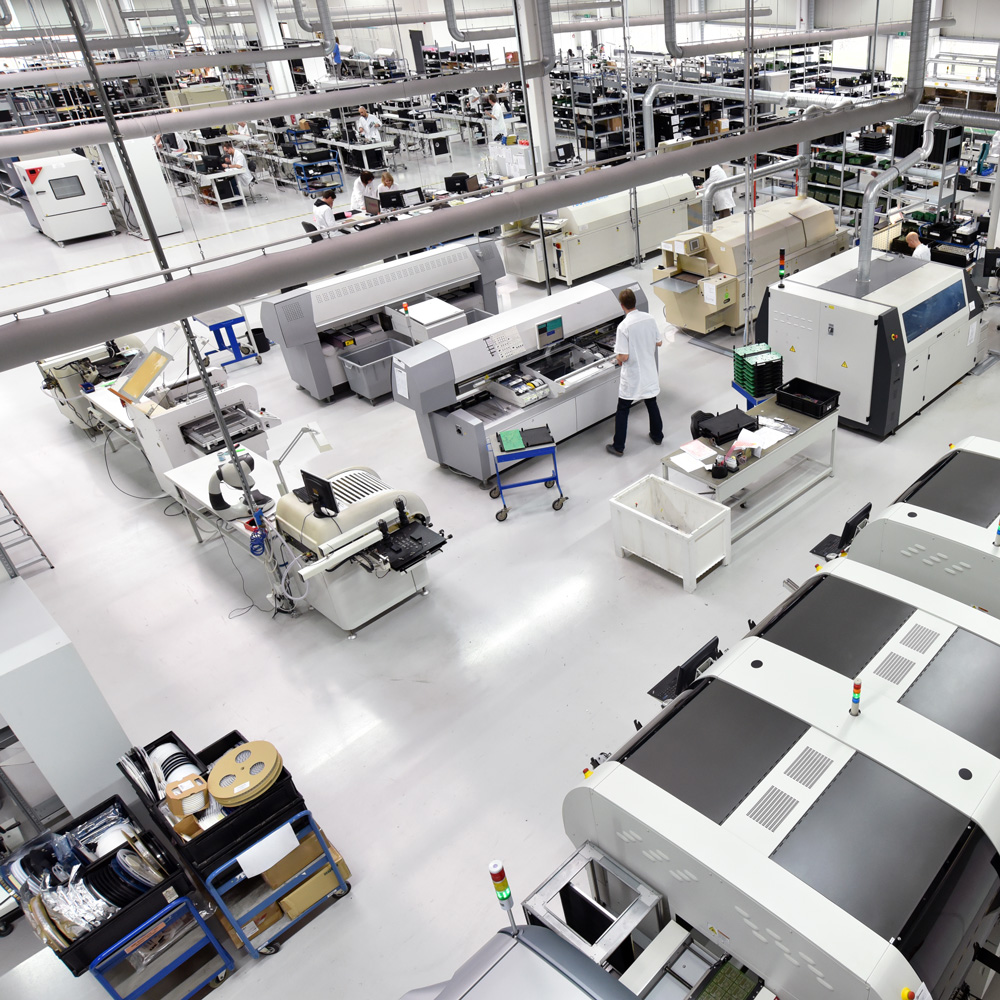Factory of the Future:
The Digital and Connected Factory
The ACTIA Group has been transforming its industrial operations for several years to deploy across its various sites the organizations, processes, skills, infrastructures, and equipment essential to the implementation of the Factory of the Future.
Whether referred to as Industry 4.0, Industry 5.0, or Smart Industry, the Factory of the Future is, above all, a performance-driven culture—serving customers, engaging teams in continuous transformation, and responding with agility to the evolving industrial landscape.

An Interconnected Industrial Culture Driving the Factory of the Future
Industry has been one of ACTIA Group’s core pillars since its founding in 1986. All products designed and developed under the ACTIA brand are manufactured in the Group’s own facilities across Europe (France, Sweden, Tunisia) and the United States.
This strong industrial foundation requires constant adaptability to remain competitive and deliver the highest levels of quality.
ACTIA invests in its industrial ecosystem to bring customers the full benefits of digital transformation, including:
ACTIA invests in its industrial ecosystem to bring customers the full benefits of digital transformation, including:
- Faster responsiveness and time savings through a Time-to-Manufacturing-Market approach that reduces waste and scrap,
- High adaptability to diverse markets and customer requirements,
- Optimization of production cycles,
- Enhanced real-time traceability and information availability.
For ACTIA, the Factory of the Future must be modular and reconfigurable, integrating new technologies—particularly IoT and AI—within a broader organizational transformation.
ACTIA’s factories are built on connectivity, creating links between people, production equipment, IT systems, supervision tools, and customers. This is enabled by MES (Manufacturing Execution Systems), which manage industrial processes by collecting and analyzing data in real time across workshops and plants.
In this digitalized environment, ACTIA has also introduced an NPI (New Product Introduction) process, which digitizes the integration of new products into production lines.
To manage the risks associated with this level of interconnectivity—data flows, machine connectivity, and connected products—ACTIA has developed a robust cybersecurity strategy embedded in its Factory of the Future vision.
ACTIA’s factories are built on connectivity, creating links between people, production equipment, IT systems, supervision tools, and customers. This is enabled by MES (Manufacturing Execution Systems), which manage industrial processes by collecting and analyzing data in real time across workshops and plants.
In this digitalized environment, ACTIA has also introduced an NPI (New Product Introduction) process, which digitizes the integration of new products into production lines.
To manage the risks associated with this level of interconnectivity—data flows, machine connectivity, and connected products—ACTIA has developed a robust cybersecurity strategy embedded in its Factory of the Future vision.

Sustainable Industrial Performance Through the Factory of the Future
For ACTIA, industrial performance and the competitiveness of its production facilities are anchored in its policy of Social Responsibility and in a sustainable vision that takes the human dimension into account.
The industrial transformation projects are thus accompanied by major training and skills development programs. For example, the installation of Cobots in factories allows operators to train so that they can devote themselves to higher value-added activities.
The human factor is at the heart of these transformations, because a “smarter” industry is necessarily more respectful of its teams and its environment. Thus, by improving its operational efficiency, ACTIA strives to provide work spaces, creativity and initiatives capable of mobilizing the commitment of teams and integrating them into a global “Move Up” approach to value creation.
The World Class Manufacturing (WCM) program deployed by ACTIA at the group’s various industrial sites supports this approach. WCM works with the teams in the field to pilot and structure continuous improvement action plans to ensure the smooth flow of production and the circulation of information and data, in the interests of customer satisfaction and ACTIA’s industrial performance.
In a constantly challenging and changing environment, ACTIA has developed the levers of reactivity and flexibility that guarantee the performance and sustainability of its manufacturing services.
The industrial transformation projects are thus accompanied by major training and skills development programs. For example, the installation of Cobots in factories allows operators to train so that they can devote themselves to higher value-added activities.
The human factor is at the heart of these transformations, because a “smarter” industry is necessarily more respectful of its teams and its environment. Thus, by improving its operational efficiency, ACTIA strives to provide work spaces, creativity and initiatives capable of mobilizing the commitment of teams and integrating them into a global “Move Up” approach to value creation.
The World Class Manufacturing (WCM) program deployed by ACTIA at the group’s various industrial sites supports this approach. WCM works with the teams in the field to pilot and structure continuous improvement action plans to ensure the smooth flow of production and the circulation of information and data, in the interests of customer satisfaction and ACTIA’s industrial performance.
In a constantly challenging and changing environment, ACTIA has developed the levers of reactivity and flexibility that guarantee the performance and sustainability of its manufacturing services.

Looking to Manufacture in a Smart, Sustainable Factory?
Benefit from ACTIA’s connected, agile, and certified industrial sites.
